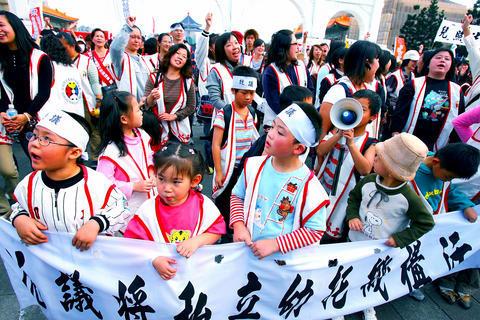The Ministry of Education (MOE) and early childhood education representatives reached a preliminary agreement after more than 10,000 pre-school and kindergarten educators took to the streets yesterday, calling on the ministry to stop neglecting education for young children and to withdraw a bill from legislative review.
After a closed-door meeting lasting an hour, MOE Secretary-General Chen Ming-yin (
Because childcare centers and kindergartens are subject to separate regulations, standards for teacher qualifications, operations and government subsidies differ, she said.

PHOTO: WANG YI-SUNG, TAIPEI TIMES
To integrate the two systems, the Cabinet introduced a childhood care and education bill to the Legislature in May.
Early Childhood Education Alliance president Huang Li-chu (
Huang said it was wrong to include babysitting services and education for children up to 12 years old in the bill.
Huang said that the government and sector agree it is necessary to integrate nurseries, preschools and kindergartens, but added that the ministry's proposal was "ridiculous" because it included such a wide range of services.
"We are educators, not businessmen. We should not be treated like we are running commercial cram schools. It is obvious the ministry does not care about early childhood education. Why is it that the ministry is willing to spend NT$50 billion (US$1.5 billion) on tertiary education for the next five years, but only a few million on pre-elementary education?" she asked.
The protesters demanded the ministry remove a regulation in the bill that would require parents to sign a contract with the school their child attends before the school year's start.
The contract template proposed by the ministry "commercializes" early-childhood education and treats children as commodities, the educators said.
"The regulation is dangerous and unfair for parents with troubled children because according to the contract, schools have the right to refuse to accept students if the students or parents do not fulfill the terms. This will indirectly create many unwanted students," Huang said.
In response to the protest, Chen said the ministry would drop the regulation and draw up an alternative proposal to ensure the quality of early childhood education.
At a separate setting, however, Democratic Progressive Party Legislator Huang Sue-ying (
In addition to integrating different kinds of education for young children under one law, the bill also aims to solve other problems, she said.
One issue is the quality of privately run schools, Alliance for Integrated Childcare Policy convener Liu Yu-hsiu (
"More than 70 percent of kindergartens and childcare centers nationwide are privately owned and operated," Liu said. "They charge parents very high fees, but a lot of them hire unqualified teachers and pay them minimal salaries."
Monthly fees for private childcare centers and kindergartens in Taipei can range from NT$11,000 to NT$17,000, while public schools average around NT$6,000, she said.
"Although operators are charging so much, the nationwide average salary for childcare workers and kindergarten teachers is only about NT$28,000," she said.
To combat the issue, the bill proposes creating more public kindergartens and encouraging non-profit organizations working with childcare issues to set up non-profit kindergartens.
Standardized contracts for private kindergartens would also be imposed under the bill, Huang Sue-ying said.
To ensure affordable childcare, both public and non-profit kindergartens would receive subsidies from the government, Huang said.
"Of course private childcare operators will be against it, but I don't think they need to worry," Liu said.
"There will always be parents who are willing to pay more to have their children attend private kindergartens," Liu said.

An essay competition jointly organized by a local writing society and a publisher affiliated with the Chinese Communist Party (CCP) might have contravened the Act Governing Relations Between the People of the Taiwan Area and the Mainland Area (臺灣地區與大陸地區人民關係條例), the Mainland Affairs Council (MAC) said on Thursday. “In this case, the partner organization is clearly an agency under the CCP’s Fujian Provincial Committee,” MAC Deputy Minister and spokesperson Liang Wen-chieh (梁文傑) said at a news briefing in Taipei. “It also involves bringing Taiwanese students to China with all-expenses-paid arrangements to attend award ceremonies and camps,” Liang said. Those two “characteristics” are typically sufficient

A magnitude 5.9 earthquake that struck about 33km off the coast of Hualien City was the "main shock" in a series of quakes in the area, with aftershocks expected over the next three days, the Central Weather Administration (CWA) said yesterday. Prior to the magnitude 5.9 quake shaking most of Taiwan at 6:53pm yesterday, six other earthquakes stronger than a magnitude of 4, starting with a magnitude 5.5 quake at 6:09pm, occurred in the area. CWA Seismological Center Director Wu Chien-fu (吳健富) confirmed that the quakes were all part of the same series and that the magnitude 5.5 temblor was

The brilliant blue waters, thick foliage and bucolic atmosphere on this seemingly idyllic archipelago deep in the Pacific Ocean belie the key role it now plays in a titanic geopolitical struggle. Palau is again on the front line as China, and the US and its allies prepare their forces in an intensifying contest for control over the Asia-Pacific region. The democratic nation of just 17,000 people hosts US-controlled airstrips and soon-to-be-completed radar installations that the US military describes as “critical” to monitoring vast swathes of water and airspace. It is also a key piece of the second island chain, a string of

The Central Weather Administration has issued a heat alert for southeastern Taiwan, warning of temperatures as high as 36°C today, while alerting some coastal areas of strong winds later in the day. Kaohsiung’s Neimen District (內門) and Pingtung County’s Neipu Township (內埔) are under an orange heat alert, which warns of temperatures as high as 36°C for three consecutive days, the CWA said, citing southwest winds. The heat would also extend to Tainan’s Nansi (楠西) and Yujing (玉井) districts, as well as Pingtung’s Gaoshu (高樹), Yanpu (鹽埔) and Majia (瑪家) townships, it said, forecasting highs of up to 36°C in those areas